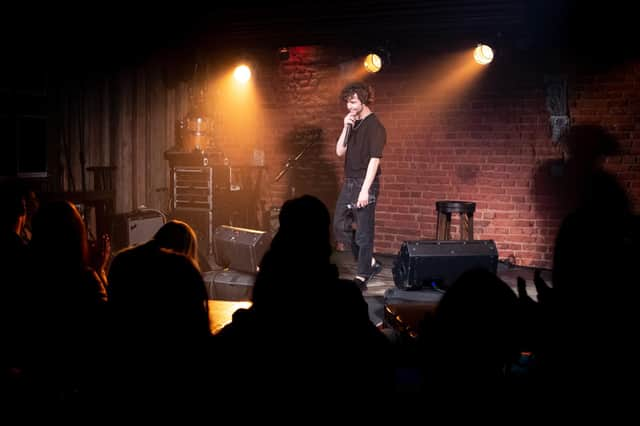I challenge any Edinburgh Festival Fringe comedian to make me properly laugh, not just snigger


The last time it happened wasn’t at any show.
It was about a year ago, in the kitchen of our flat, when my husband pulled the right face at the correct time, and gave me the paralytic giggles.
I only remember exactly where I was standing because it’s such a rare occurrence. My LOLs have really dried up. My funny bone is in a stookie. I’ve inhaled the non-laughing gas.
Advertisement
Hide AdAdvertisement
Hide AdAnd, apparently, I’m not unusual. Us middle-aged folk are a tough crowd to crack. I would be nervous if I was a stand-up and saw a salt-and-pepper-haired audience in front of me.
Life does have a habit of sucking the funnies out of you. According to a much cited Gallup survey from way back in 2014, which involved a simple question, “Did you smile or laugh a lot yesterday?” addressed to 1.4 million people across 166 countries, we start losing our sense of humour at around the age of 23.
Babies laugh about 400 times a day, while at 35, it’s more like 15. At my age, it can be tough to even raise a smile.
In contrast, when I was at high-school, I got regular detention because of my uncontrollable laughter problem.
My friend and I once got in trouble because we drew pictures of what we imagined chickens’ faces would look like without beaks. (Essentially, Pac-Man). I can’t fathom why the teenage me found this so hilarious. We couldn't even speak when the teacher asked what they were supposed to be.
I had the same difficulty at college. Usually, I’d be set off in a situation where you’re not supposed to laugh, so, in a lecture, say. I’ve had similar memorable moments in a particularly po-faced tai chi class and at a family wedding. Don’t worry, I held it together and haven’t been excommunicated.
But maybe that’s the secret. You have to create tension before releasing it. I might get the best laughs if I started going to church.
Of course, humour is also subjective, and I know what I enjoy. I like a bit of the surreal, and a lot of the sillies. The more daft the better.
Advertisement
Hide AdAdvertisement
Hide AdThe only thing that still works relatively efficiently is if I force my other half to dance. It’s amusing to see a lanky person flail around like he’s at a drunken rave. Sometimes I’ll put a tune on in the hallway of our flat, and attempt to flush him out. Sadly, he often complains that he is not my performing monkey.
“Turn that off, I’m in a meeting,” is the regular angry exclamation that comes from whatever room he’s lurking in. I switch the music off, dejected. Tomorrow, I will try again, but with better bait, maybe MC Hammer. He better try harder, because he should know that the dances are the only reason I put a ring on it.
This lapse might mean that he’s losing his sense of humour too. At least things might get better with time. That Gallup poll also revealed that laughter levels started to rise again in the seventies and eighties age group, so it seems that the temporary sag might have something to do with the career years. In fact, the survey demonstrated that we laugh less on working days.
I guess joking is seen as being facile, and most of us want to be taken seriously. Not that there’s much opportunity to laugh with colleagues or bosses when you’re working from home. Maybe at our next virtual work meeting, I’ll try to shake things up with some mime. We could start with a bit of going-down-in-a-lift action on screen, then do the whole trapped-in-a-box routine. Or I could just get my husband to do a short dance for them.
It’s worth a shot. Although it might not be CV worthy, humour is a social skill, and, they say, releases endorphins, decreases stress hormones and increases blood flow to organs.
If organisations want to pay lip service to mental health, they might want to pay better attention. Even enforced giggles are better than nothing. I know this as I once tried a laughter yoga workshop and it was interesting to see how infectious the action can be.
At first, we had to force the awkward sniggering, while pretending to start up an old-fashioned lawnmower - don’t ask - then the mass hysteria came naturally.
It’s weirdly empathetic, like crying. Thinking back, it was actually all a bit cringe. I was lolling, but with fear in my eyes. It was as if I had unwittingly joined a cult, but I still felt a bit high afterwards.
Advertisement
Hide AdAdvertisement
Hide AdThat’s because my brain had released the feel good chemicals. It can also react to your laughter, so I suppose the rattly old walnut doesn’t really know what’s funny. Left to its own devices, it’d probably enjoy the work of James Corden.
Despite all this, I’m not saying I don’t laugh every day, because I do. It may not be the prime hysteria of my youth, but that’s okay.
The Edinburgh Festival Fringe has barely started and I’ve already chortled at comedian Jason Byrne and The Umbilical Brothers. I’ve interviewed comedians including Krystal Evans and Ian Smith, and I’m sure their shows will be brilliant.
If they can make me ROFL, they might be in the money.
Comments
Want to join the conversation? Please or to comment on this article.